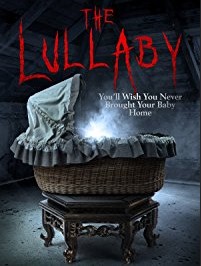
(A.k.a. SIEMBAMBA [original title])
A prologue clues us in to the dark history surrounding the small South African town of Eden Rock. We're in 1901, where British colonials enslave the locals and force them to toil in concentration camps. When the women aren't being used for labour, they're being raped by their aggressors. Any woman unfortunate enough to fall pregnant suffers the agony of going through childbirth, only to then watch helplessly as their child is taken away by a mysterious figure in a black bonnet (Lara de Villiers) and murdered.
Fast-forward to the present day, where we meet 19-year-old Chloe (Reine Swart). She's in the labour ward going through an extremely painful-looking procedure of giving birth herself. Her mother Ruby (Thandi Puren) watches close by, and is quick to get in Chloe's face, berating her, when she shows signs of weakness. A son, Liam, is born shortly afterwards - though Ruby has to embrace the child, as Chloe simply turns his back on him. The father is not present at the birth, and Chloe is unwilling to disclose his identity.
And so, Chloe checks out of hospital a few days later, and is driven by Ruby back to her old family home in Eden Rock. Chloe is clearly unhappy to be back in the town she grew up in, having ran away from there several months earlier for reasons unbeknownst to us.
Before long, the pressures of motherhood are getting to Chloe. She can't get her breast-pump to work properly, she obsesses over noises heard via her baby monitor, and Liam never seems to sleep. Chloe looks haggard, all sunken-eyed and unkempt. Former boyfriend Adam (Deanre Reiners) visits her, offering male attention which she seems thoroughly unimpressed by. Ruby isn't really helping; she undermines and dictates to her daughter at every opportunity. "Being a mother is hard," she tells her without compassion, "the sooner you realise that, the better".
As Chloe's anxieties mount and her sleepless nights continue, she begins to experience strange occurrences in the household. A television set switches itself on; Liam has unexplained scratches on his face; on one occasion, the child is locked in their bedroom from the inside, with Chloe frantically trying to get in on the other side of the door. Oh, and she begins to receive ethereal visitations from a mysterious figure in a black bonnet who quietly encourages Chloe to harm her son ...
Chloe's hallucinations grow more severe - at one point she sees herself hacking her son's fingers off while trimming his fingernails. She grows negligent and detached as a result, to the point where Ruby visits an old family friend for help, acclaimed psychiatrist Reed (Brandon Auret). He's concerned that Chloe may be abusing her child, and agrees to meet with her for an assessment.
While analysing Chloe's disturbed state of mind, Reed takes the unusual step of advising her to do whatever her visions are telling her to do. Which can only lead to more trouble, surely ...?
THE LULLABY is written by Tarryn-Tanille Pinsloo, the in-house screenplay writer for the film's production company, Phoenix Films. Pinsloo offers an insightful female perspective on the anxieties, both physical and mental, of motherhood. The perpetual exhaustion, the feeling of not getting anything right, the hormonal changes - all of these are observed with the sense of acute first-hand experience. Any parent, of any gender, should be able to identify with Chloe's struggles here, and recognise the well-intended but ultimately borderline-bullying nature of her overpowering mother.
The manner in which the pressures mount on Chloe and we begin to doubt her prowess for parenting, or indeed her commitment to the task, and the ambiguous nature of the more supernatural visions which plague her, undoubtedly bring to mind THE BABADOOK. There are parallels, certainly, but THE LULLABY is definitely its own beast. From the opening prologue and the references throughout to South African culture, living standards and morals, this is an extremely home-grown product with something to say about its country's legacy and how it continues to shape its principles today.
It's also a lot darker than THE BABADOOK. Where that film flirted with the genre, THE LULLABY throws itself balls-deep into an unsettling, frequently creepy world of self-doubt, horrific hallucinations and effective (if admittedly cliched) horror tropes.
The film maintains a dour tone throughout, which pretty much indicates from the get-go that we shouldn't go into this expecting everything to turn out peachy. And it does slow down dramatically once it settles into a second act which is essentially a series of conversations between Chloe and Reed.
But, it's thanks to the intricacies of Pinsloo's script and the above-average cast (particularly Swart's heartfelt, convincing performance) that this film rises above such shortcomings and emerges as a genuinely worthwhile prospect. It helps that it's directed with an assured hand by veteran Darrell Roodt (yes, he who made the likes of SARAFINA!, FATHER HOOD and DANGEROUS GROUND).
Attractive cinematography and inventive sound design help matters along the way, the canny colour-correction assisting the finished product in escaping the look of an obvious low budget (only the prologue looks cheap).
THE LULLABY is available as a Video On Demand title via Uncork'd Entertainment. We were sent an online screener link for review purposes.
The film was presented in its original 2.35:1 ratio and benefited from a clean, crisp HD sheen. Colours are deliberately muted somewhat, lending events a sobering effect. Shadows and blacks hold up extremely well, detail is fine and depth is natural-seeming throughout.
Likewise, the English 2.0 audio on offer is a solid problem-free proposition.
All in all, THE LULLABY is an interesting and engaging take on maternal paranoia, with a healthy dose of ambiguous supernatural suggestion thrown in. It offers little respite, and comes with the added attraction of (what should be) a career-making role from Swart. It has its flaws (see above), but I still recommend this one.
Review by Stuart Willis
| Released by Uncork'd Entertainment |